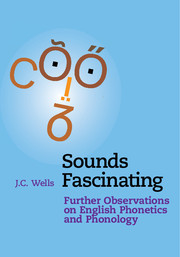10 - Phonetic Processes
from PART II - SOUNDS AND LETTERS
Published online by Cambridge University Press: 05 September 2016
Summary
But …
A correspondent asked me about the pronunciation of but when it means ‘except’, for example in contexts like I could come any day but Thursday, There's no one here but me, He was unable to swallow anything but liquids. Would native speakers use the weak form bət here, as in most other contexts; or would they prefer the strong form bʌt?
My answer is that in these cases I would normally use the weak form, bət. A strong form would sound odd.
The only cases in which strong bʌt is usual would appear to be
• citation (‘mention’), as in no ifs and buts;
• clumsy reading aloud;
• for special emphasis
It'll be difficult, | \/but | it's still possible.
• and when stranded by a following syntactic boundary.
Perfect? It's anything but!
Before a pause you can have either a weak or a strong realization.
We are not yet ahead, but … er … one day we shall be.
For the weak form in fluent speech, where the following sound is a consonant, we commonly get the glottalled variant bəʔ. I have noticed, though, that in my own speech if the following sound is the w of a function word, as in but what we ought to do, but when I arrived, I tend to say just bə, i.e. to elide the t entirely. I do not know to what extent other speakers do this.
Spinach Sandwiches
The questions that no one can answer often involve why. A Japanese student asked me, ‘Why do people pronounce sandwich with dʒ, given that the spelling is -ch?’
Not everyone does, of course. But in my BrE preference poll I found that 53% of respondents voted for -wɪdʒ in this word and only 47% for -wɪtʃ. Given the biasing effect of the spelling, the true figure for -wɪdʒ is probably quite a lot higher. (In AmE, on the other hand, I think we always get -wɪtʃ.)
The same alternation also seems to apply to all other words ending in -wich. Thus Norwich can be ˈnɒrɪdʒ, Woolwich can be ˈwʊlɪdʒ, Dulwich can be ˈdʌlɪdʒ.
- Type
- Chapter
- Information
- Sounds FascinatingFurther Observations on English Phonetics and Phonology, pp. 73 - 84Publisher: Cambridge University PressPrint publication year: 2016

